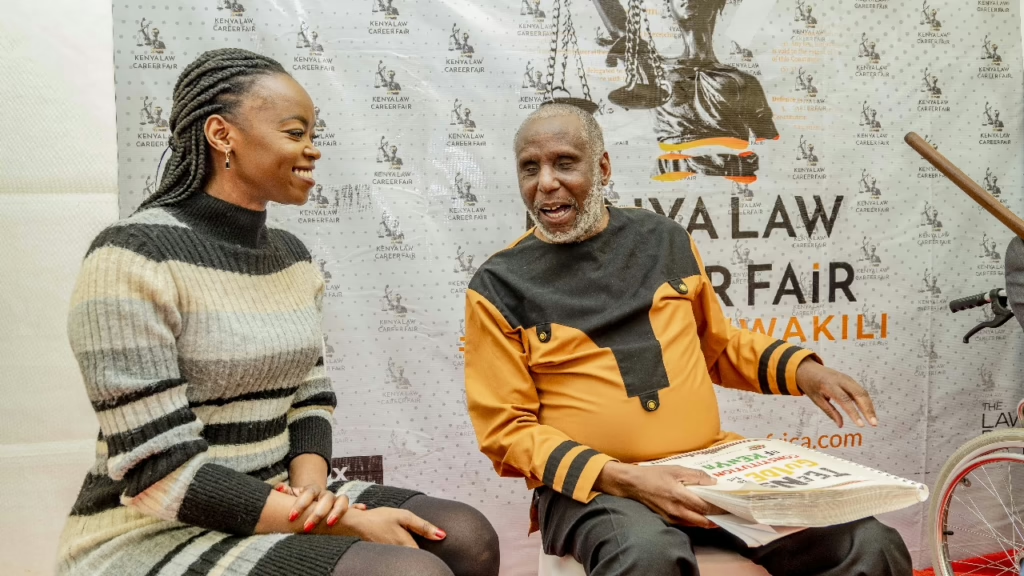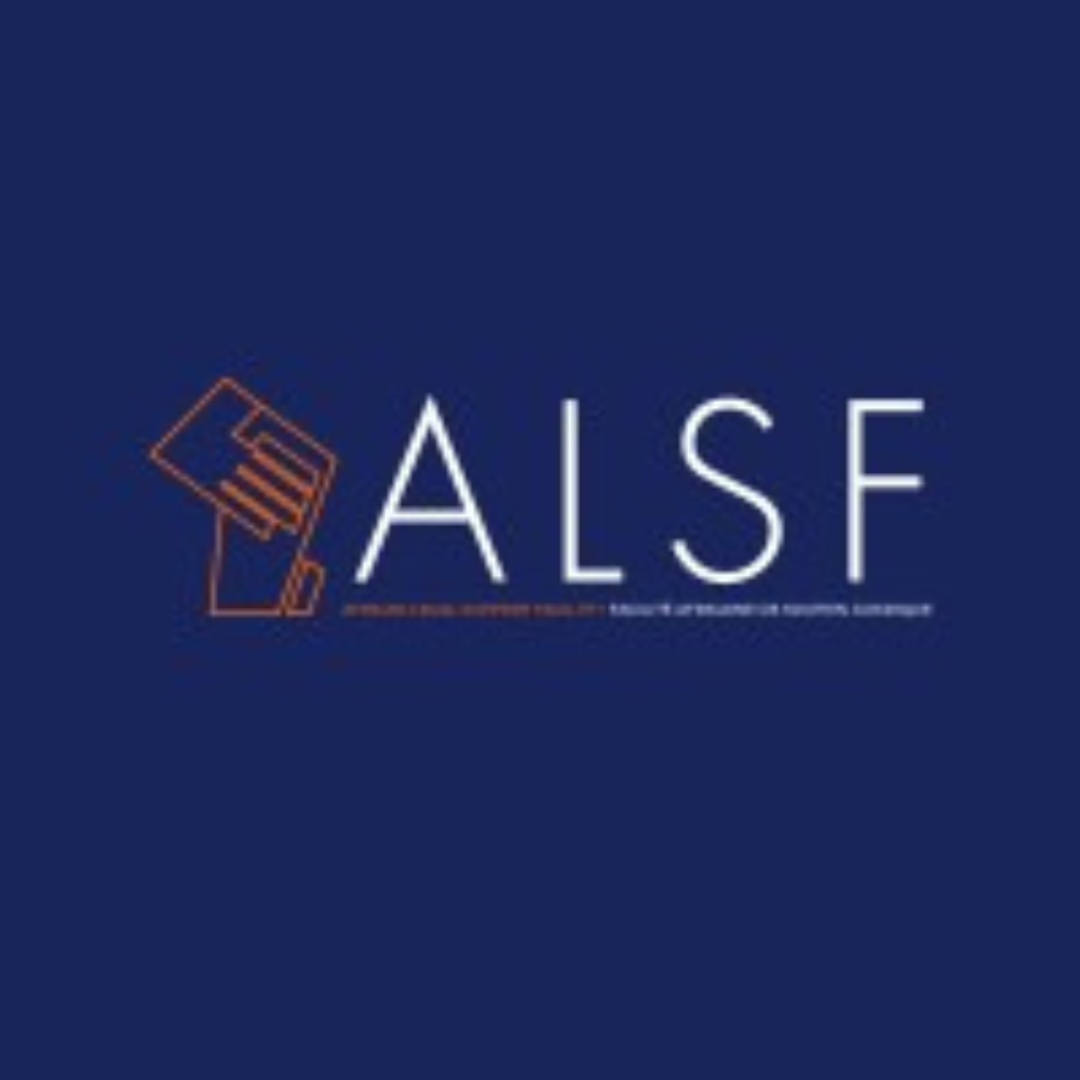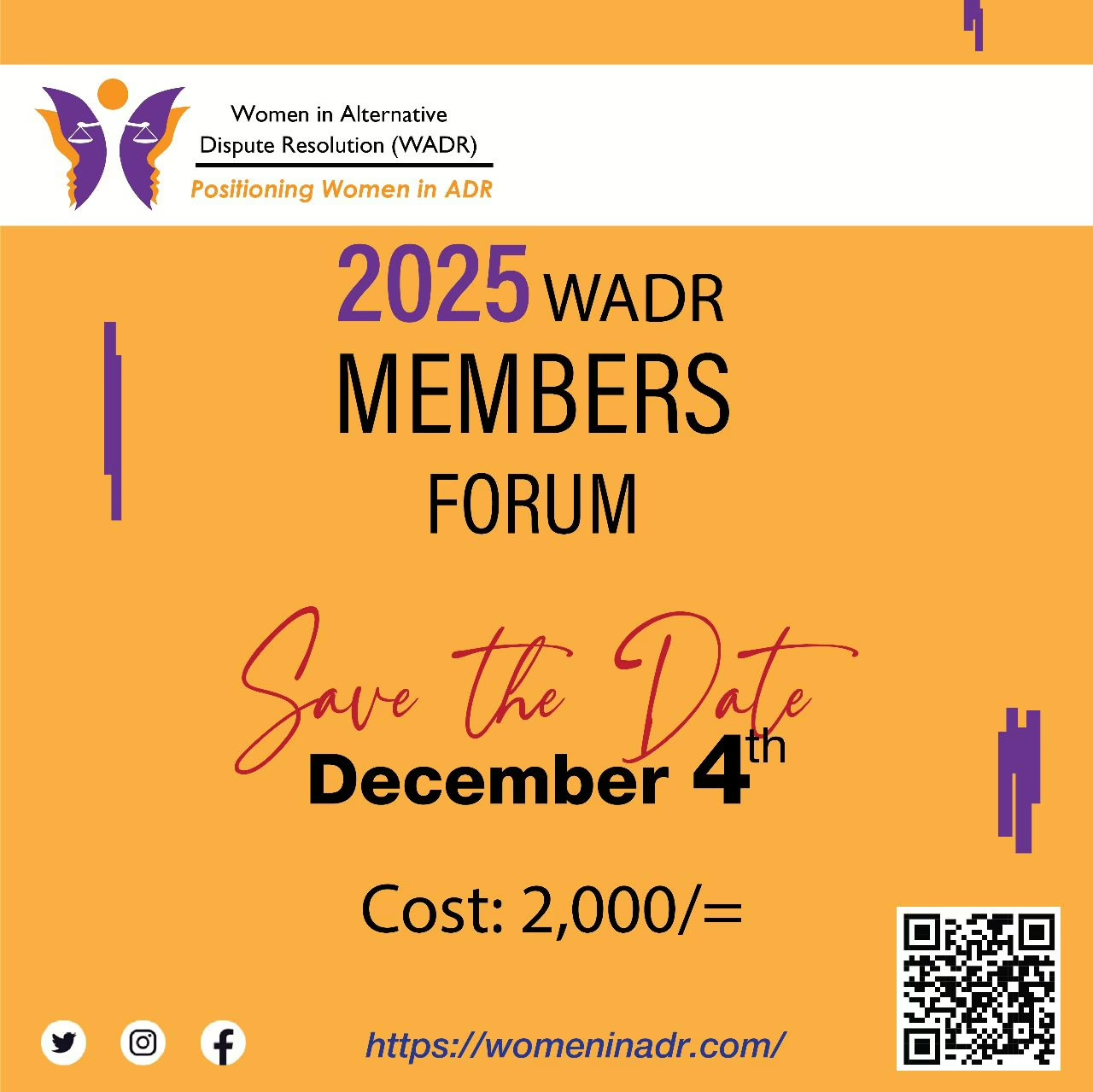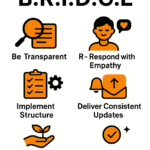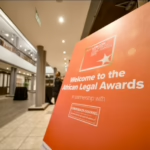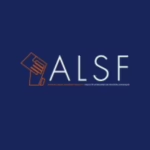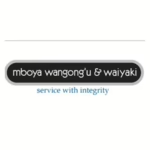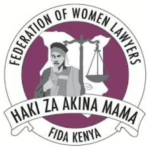You’ve probably seen her as a guest on your favorite morning radio show or your favorite drive show. 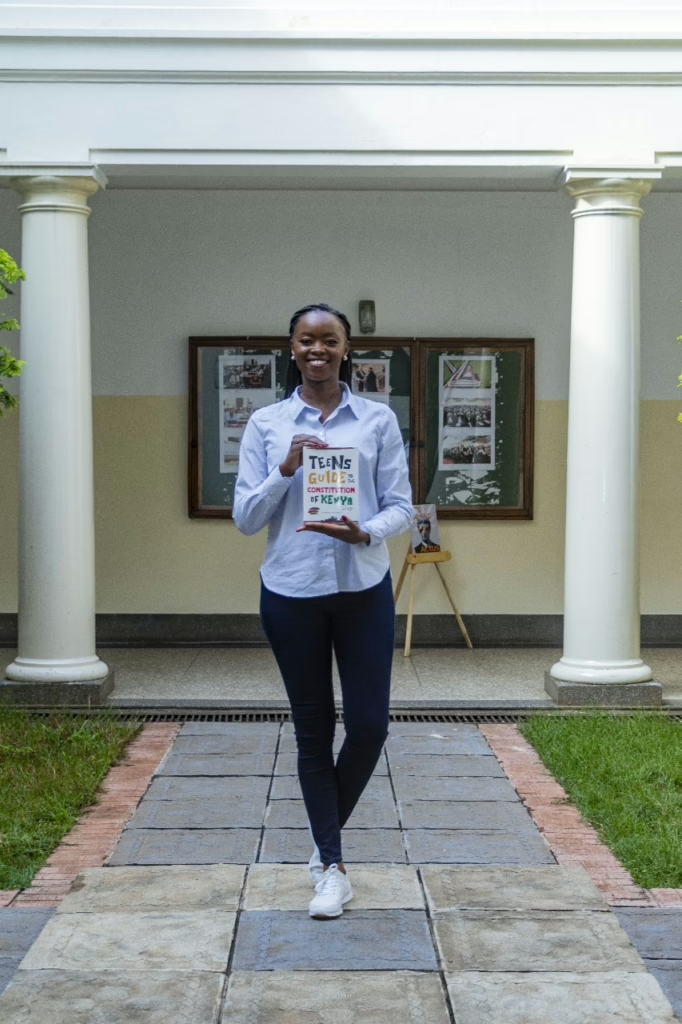
“It’s a beautiful book, and a tool meant to support young people as they engage civically, and also to prepare them for life as adult citizens.”
Moreover, the book is available in Braille, and it was such a full-circle moment for us to see the students from Thika School for the Visually Impaired read it aloud during our 2025 Law Career Fair High School Edition on 5th July, 2025. What a momentous win for inclusivity!
Back to Sandra, she’s spent almost a decade empowering tomorrow’s leaders and citizens. Besides authoring the most user-friendly civic education guide for teens, her portfolio also includes Teendom Africa, a platform for teens by teens. Teendom Africa’s latest program is the inaugural Teendom Awards, which launched this September (details below).
So, why the focus on teenagers? What makes this particular demographic ripe for civic education and empowerment? Which empowerment gaps does Ms. Ochola intend to fill through Teendom Africa? Learn more as we unveil Sandra Ochola and her journey to becoming the role model who consciously chooses to utilize her legal skills to empower teenagers and young adults, shaping them into holistic individuals.
Coming into Self: Sandra’s Formative Years
Sandra hails from Kisumu County and had a fantastic childhood growing up in the lakeside city. Besides Kisumu, she attended various schools across the former Nyanza province.
As a teenager, Ms. Ochola enjoyed a well-rounded school life. Besides her books, she was also a stellar athlete, representing her school in athletics competitions, and served as the Games Captain at her high school.
“My favorite subject in school was biology, and I thought I’d pursue a biology-related career post high school.” However, Sandra’s mother had different plans. “One evening, during that period between high school and university, my mother handed me an envelope. Inside the envelope was an admission letter to Moi University Law School. That was how I ended up in Eldoret studying law a month or so later.”
Sandra reflects on her journey into law, which was never her first career choice. “We didn’t have many role models at the time, so if you wanted to pursue something not yet pursued by anyone within your family or community, then the choice would be easily dismissed for being too alien.”. “Most times we ended up taking up career paths/ aspirations that are acceptable within the family, and we all know what they are in a typical African family setup.” She adds humorously.
By all accounts, Sandra is an astute lawyer. However, she candidly admits that her first two years in law school were bittersweet. “Looking back, I wasn’t mentally and emotionally prepared for law school because, first, it was abrupt, and second, it wasn’t my choice.” However, going to law school had its perks: being away from home for the first time and experiencing some independence was beneficial to her. “Even as I attended classes, my first year in law school was a time of exploration, embracing self-discovery, and building self-awareness.”
For Sandra, self-discovery and self-awareness meant participating in the university’s co-curricular activities, which saw her participate in activities like dancing and modelling in the university’s pageants.
“If I weren’t a lawyer and writer, I would have definitely been in the fashion and entertainment industry. I loved modelling because it gave me the chance to showcase beauty, elegance, and connect with myself and others. Additionally, it gave me a platform to showcase my gifts and talents, which were things I enjoyed. The beautiful photographs I got to take were also part of the allure.”
Sandra contested for Miss Moi University in her second year and was crowned the beauty queen. She also contested for Miss World Kenya during her last year of law school and made it to the finals. “At that point, the plan was to win the pageant and travel the world. However, life had other plans.”
Eventually, the law grew on her, and she really enjoyed her classes between her 2nd year and 4th year. “By the 2nd year, I understood what was being taught, particularly with the introduction of Communication and Constitutional Law classes.”
Constitutional Law, which she studied under the tutelage of H.E. Prof. Kithure Kindiki, Deputy President of the Republic of Kenya, was her favorite course in the law school curriculum. She credited her love for the course to its content, relatability, and perhaps the lecturer’s teaching style. However, constitutional law would play a significant role in shaping her legal career.
Her time at Kenya School of Law (KSL), which included pupillage under Senior Counsel Dr. Gibson Kamau Kuria, was equally fulfilling, but for different reasons. “Beyond being independent, KSL was an opportunity for me to advance my practical knowledge and grow my network. Senior Counsel Dr. Gibson Kamau Kuria was a fantastic mentor, a gentleman, and a father figure who led by example. He created a very conducive environment for us as pupils to thrive.”
She learned invaluable lessons from her pupil master, including humility, the value of self-assurance and self-respect, effective time management, and the pursuit of excellence. “Senior Counsel Gibson Kamau Kuria’s work is exemplary. I believe it was by working alongside him that I sharpened my research and writing skills. He taught me how to be thorough. I left my pupillage, not necessarily as a fine-tuned lawyer, but definitely as a better human being.”
Sandra’s writing and research skills would play a significant role in her journey as an author. Second, she emulates Mr. Gibson Kamau Kuria by unreservedly pouring her wisdom and experience into the next generation.
Ms. Ochola was admitted to the Bar in October 2009. Although having one of the greatest Kenyan legal minds as her pupil master was a privilege, she didn’t enjoy practice in a law firm. “I don’t thrive in routine, yet most elements of practice are routine (going to court, making presentations, and the strict dress code). Even though I passed my KSL exam with 9Ps on the first attempt, the Commercial Transactions unit was a terror that created in me a phobia for anything commercial related.”
In the Seat of Change Through Civil Society
Fortunately for Sandra, an internship opportunity arose at the International Center for Transitional Justice (ICTJ), an organization that handles matters of transitional justice. For context, this was between 2009 and 2010, after the infamous 2007 Post-Election Violence (PEV).
She credits her time at ICTJ for broadening her worldview, offering new perspectives, and providing her with the flexibility to pursue her passions, while shaping her career. Her duties as an intern at the ICTJ included research, brief-writing, and community engagement.
“Dealing with transitional justice entailed having conversations around what we could do as a country to avoid a recurrence of the post-election violence. It was an interesting experience for me because I was going out, interacting with people, and listening to diverse perspectives. I enjoyed having conversations with people on the ground, in the comfort/security of their natural environments.”
Sandra also worked alongside warm and fantastic mentors at the ICTJ, including Mr. Njonjo Mue, who is currently the Chair of the Board of the International Institute for Legislative Affairs.
“I remember when I was only two or so weeks into the internship and Mr. Mue had to travel to London for a meeting. He left me in charge of the office with a list of tasks, which included sitting in specific meetings and hosting the organisation’s international guests. His only instruction was to call him in case I needed anything. Being trusted with such responsibility at such an early stage of my internship was empowering for me at a personal and professional level.”
After her three-month internship at the ICTJ, Sandra’s next work opportunity was with South Consulting, a governance and development think tank, which was contracted to monitor the Kenya National Dialogue and Reconciliation Accord (the Kofi Annan Accord).
“The engagement was to monitor four Agenda-4 items, and here I got the opportunity to monitor the reform engagement work proposed in the Agenda-4 Agreement, including constitutional and institutional reforms. The reforms were intended to lay a solid foundation for Kenya moving forward.”
Working at South Consulting was also an excellent experience for Sandra in terms of growth because it aligned with who she was, her goals, and her interests. She also loved that the job infused the legal aspects with human interest and justice issues. Additionally, like with her previous engagements, she was surrounded by individuals like Mrs. Prisca Kamungi, who were keen on nurturing and growing her and ensuring she excelled in her work.
As highlighted above, South Consulting’s mandate included constitutional reforms. Consequently, Sandra had a unique opportunity to participate in the Constitution of Kenya, 2010 referendum as an observer, on behalf of South Consulting. “Looking back, I can clearly map out the connection from the constitutional law classes in law school to conducting research on constitutional issues, to then engaging the community on constitutional affairs. There was never a dull moment with constitutional law.”
Beyond the constitutional reforms, there were institutional reforms, including police and judicial reforms, that Sandra found equally immersive. “I was part of the Police Reforms Working Group, and I remember doing a lot of advocacy for the current laws, including on Article 246 of the Constitution, which established the National Police Service Commission, and the National Police Act (2011) as amended. These are the laws which made the appointment of the Inspector General of Police open and competitive.
Other elements she tackled under Agenda 4 with South Consulting included collaborating with other institutions to draft the Internally Displaced Persons (IDPs) laws and the Access to Information Act.
After her tenure in South Consulting, Sandra transitioned to Katiba Institute (KI) as a Program Officer for community engagement issues. Her role at the institute entailed community sensitization/training on the constitution and its implementation processes.
Katiba Institute was established after the promulgation of the Constitution of Kenya, 2010, to engage the public and help Kenyans understand and interact with the new constitution.
“I met equally fantastic people at KI, including Prof. Yash Pal Ghai, Dr. Jill Cottrell Ghai, and the institute’s first director, Mr. Waikwa Wanyoike. They all did a fantastic job training me on the practical elements of constitutional law and Public Interest Litigation (PIL).”
Sandra notes that PIL wasn’t as prevalent back then as it is today. However, she underscores that Katiba Institute did a fantastic job setting the groundwork for PIL. PIL remains KI’s mainstay, and you can read more about Katiba Institute’s programs here.
It was through the support and guidance of her KI supervisors above, that Sandra developed the Teens’ Guide to the Constitution of Kenya.
Teens’ Guide to the Constitution of Kenya
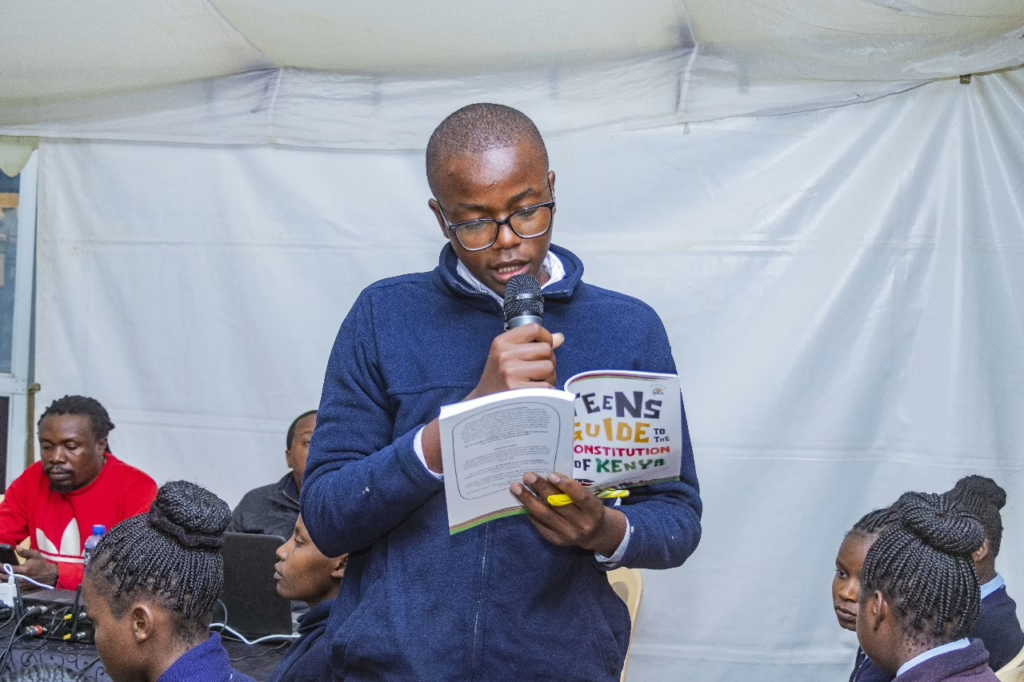 So, why did she choose to focus on teenagers as a vulnerable group?
So, why did she choose to focus on teenagers as a vulnerable group?
“Drawing from my personal experience as a young adult who knew next to nothing about my country, I felt obliged to focus on teenagers and young adults. If I may give an example, before joining ICTJ, I had no encounter with tribalism or violence, because I grew up in a somewhat sheltered environment. PEV was shocking from a moral perspective. Moreover, I was even more shocked to learn that Kenya has had cycles of electoral tension and conflicts since the early 1990s; it just so happened that the 2007 PEV was the most severe manifestation of this pattern. So, why wasn’t I told?”
Sandra also flashes back to when she was a first-time voter and had registered to vote in her hometown of Kisumu. “I remember being told by the adults around me that ‘You shall vote for Kibaki,’ and that’s it, no explanation or engagement.”
As a young person, then, you didn’t have a voice or the knowledge to inform your civic decisions. So, you ended up just going with the flow when casting your vote. I felt at a loss because I didn’t understand why the grown-ups wanted to hurt former president Moi by removing him from power, yet he was all I knew of politics and leadership growing up.”
She concludes by highlighting that the knowledge gap that leaves young adults ill-equipped to engage in civic duties, arises from the assumption by the adults, that the young do not need to be civically equipped just yet or that their views on political conversations do not matter.
“The justice and reconciliation phase meant that, as a country, we were at a juncture where everyone was starting afresh. Starting afresh meant that everyone needed information and other tools that they would require to participate fully and meaningfully, in this change that everyone was anticipating and this included the children and youth.”
However, Sandra highlights that most of the tools, which were dominantly reading materials, were curated for adults and legal professionals. The lack of simplified resources automatically locked out many young people who were curious about the new constitution. She asserts that bridging the knowledge gap for teens and young adults empowers them to receive factual, relevant, and timely information on who we are as a people. However, the information should be curated in an age-relevant format that young people can engage with, enjoy, and learn from.
Nonetheless, she points out that packaging the information on the state of the nation for teens only fills one gap. We need to go a step further and give young people their voice, or let them have conversations on national issues without the assumption that they don’t know, don’t need to know, or that they don’t need to participate.
Sandra’s desire and hope for a civic-empowered generation kept building up since that voting incident. Thankfully, everything aligned when she was at Katiba Institute, where she dealt with constitutional matters daily. It felt like the right place to execute this idea that had been gnawing at her for years. For one, her designation as the Program Officer for community engagement meant that she spent a lot of time breaking down the constitution into user-friendly bits, which she used as training material during community engagements.
Accurate, timely, and actionable information is a crucial ingredient for empowerment. Thanks to Sandra’s effort, commitment, and determination, the Teens Guide to the Constitution of Kenya is available to today’s teenagers.
However, it’s worth noting that civic education is only one piece of the puzzle when it comes to moulding the next generation into empowered citizens. Catch part two of this series as Sandra unpacks her other projects and programs for teenagers, including Teendom Africa and the Teendom awards.


